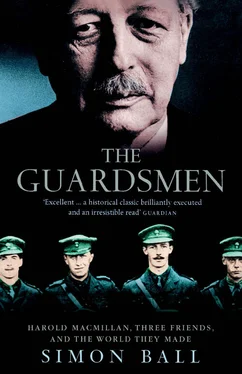The Guards Division’s attack on Loos was hardly a triumph of the military art, the 4th Battalion Grenadier Guards alone having lost eleven officers and 342 men – ‘it has been’, Macmillan recorded, ‘rather awful – most of our officers are hit’. Nevertheless the Guards exculpated themselves from all blame. ‘The Guards Division,’ Macmillan proudly proclaimed, ‘has won undying glory, and I was long enough there to see the lost Hill 70 recaptured. ’ 75 Indeed Jummie Morrison’s sad remnant had been sent to dig in on the hill that night, although in truth the Guards had only captured the western slopes, leaving the Germans in possession of the redoubt. From both Macmillan’s perspective as a platoon officer and from Lyttelton’s rather more elevated position at divisional HQ, it seemed that the Guards elite had been let down by Kitchener’s army. ‘Some of the New Army Divisions are rather shaky,’ Macmillan wrote the day before the Guards went into action, ‘my chief feeling at present is one of thankfulness that I am in the Brigade of Guards. All the way up on the road we were greeted with delight by the wounded and all other troops. And it is so much easier to command men who seem to obey orders with engrained [ sic ] and well disciplined alacrity as soon as they are given.’
‘That the 21st and the 24th divisions,’ Lyttelton confirmed, ‘completely spoilt the show is I fear true.’ Like Macmillan he felt that, as a Guards officer, he was in a position to patronize the line infantry. ‘I’m afraid,’ he observed with all the assurance of a man of twenty-two, ‘that the New Army is trained too much with the idea: Oh we don’t need discipline. These are not recruits driven into the ranks by hunger, they are patriots, it’s ridiculous to ask a well-educated man of forty to salute an officer of twenty, and so on. The alpha and omega of soldiering and training is discipline and drill.’ ‘However,’ he charitably conceded, ‘those divisions of the New Army who have been blooded did quite creditably, the ninth and the fifteenth. The Territorials, who have some tradition if no discipline, attacked with great gallantry if not very efficiently.’ Alternative accounts circulating in London drew his derision: ‘As to the Guards Division being three hours late it is simply pour rire and goes to prove how very little people know of the war.’ 76
It was not only the Guards that used the ‘Kitchener’ divisions as scapegoats for the failure of the Loos offensive. Haig also laid the blame at the door of their tactical inadequacies. GHQ’s post-mortem on Loos called for an increase in offensive raids and enhanced training for and use of grenades. 77 Thus the Guards found themselves thrust back into low-level but high-intensity warfare in the trenches just north of Loos. The post-Loos battle lines meant that in some places the British and German trenches were only thirty yards apart. There were continuous bombing and sniping duels. For the first time 2nd Battalion snipers were issued with telescopic sights, making the duels even more deadly. Crookshank was an early victim. 78 On 23 October his company commander took advantage of visionobscuring mist to send him out at the head of a wiring party. He led his men out and back safely. As they gathered more wire to go out again, a German sniper shot him in the left leg. The bullet seems to have been a ricochet, for although it ended the 1915 campaigning season for him, it did no permanent damage. The next day he was safely ensconced on a hospital train heading back to the coast, ‘very comfortable and everything to eat and drink that we wanted’. 79 Comfort levels improved even further when he reached England: he was sent to the officers’ nursing home housed in Arlington Street, next door to Cranborne’s London home.
Crookshank’s wound meant that he missed the arrival of a national celebrity to serve with the 2nd Battalion. Winston Churchill, ejected from the Cabinet in disgrace after the failure of the Dardanelles expedition, was assigned to a reluctant Jeffreys to ‘learn the ropes’ before taking command of his own unit. Lyttelton, visiting the battalion dugout of his old unit, was surprised when the ‘well-known domed head and stocky figure’ emerged out of the darkness. It was their first proper meeting: Churchill, following his defection from the Tory party to the Liberals in 1904, had been persona non grata in the Lyttelton circle during Oliver’s school and university days. That night at dinner Churchill held the floor. ‘We listened – we had to,’ Lyttelton remembered, as Churchill expounded his idea that the ‘land battleship’ or ‘tank’ would break the deadlock on the Western Front. 80 Churchill went on to describe to his sceptical audience the first trials of the new weapon that had taken place at Hatfield House. Later he was to present Lord Salisbury with the first tank as a memento to stand in the grounds.
In his letters home Churchill gave a vivid picture of the brutal war fought by the Grenadiers in the winter of 1915. ‘Ten grenadiers under a kid went across by night to the German Trench which they found largely deserted or waterlogged,’ he informed his wife, instructing her for obvious reasons to keep this account to herself.
They fell upon a picket of Germans, beat the brains out of two of them with clubs & dragged a third home triumphantly as a prisoner. The young officer by accident let off his pistol & shot one of his own Grenadiers dead: but the others kept this secret and pretended it was done by the enemy – do likewise. The scene in the little dugout when the prisoner was brought in surrounded by these terrific warriors, in jerkins and steel helmets with their bloody clubs in hand – looking pictures of ruthless war – was one to stay in the memory. C’est tres bon. 81
So many regular Guards officers were killed at Loos that ‘even old-fashioned Guardsmen became convinced’ that the ‘patriots’ would have to be used to fill junior command positions: ‘from this time onwards’, noted the official history, ‘the battalions of the Guards Division were officered to a large extent by officers of the Special Reserve with very short training behind them’. 82 Lyttelton was one of the first ‘beneficiaries’ of this policy. 83 He had never really become comfortable as Cavan’s ADC. Cavan’s other ADC was his brother-in-law, Cuthbert Headlam, who was a good deal older than Lyttelton. Lyttelton was thus very much the youngest and most junior member of the divisional team. 84 There was ‘nothing very much to do but fuss about horses and motor cars’. He was thus sanguine when it became clear that his position on the staff was untenable. When the adjutant of the 3rd Battalion went sick with varicose veins in the middle of the battle for Loos, Lyttelton was offered the chance to take his place. ‘It was,’ he admitted, ‘rather unpleasant leaving our comfortable chateau especially as I knew that we were for the trenches and probably for a push…it was certainly not cheering.’ 85 The offer was, however, too good an opportunity to miss, since he ‘should anyway [have] had to return to duty with the Grenadiers as their losses have been so severe as to amount almost to irreparable’. He consoled his mother with the thought that ‘an Adjutant is far safer than a company officer’. 86
To become adjutant of a Guards battalion was quite a promotion. The adjutant was the senior captain in the battalion and in charge of its day-to-day organization. He acted as the staff officer to the commanding officer and was third-in-command in battle. The opportunities for promotion opened up both by casualties and the winnowing out of less forceful officers piqued the ambition of the army’s ‘thrusters’. Although this was really a game for regulars who could aspire to higher command positions, Lyttelton caught the bug. From late 1915 onwards his letters are as much about his ambitions and disappointments concerning further promotion as they are about the routine of trench warfare. He was turning into a first-class ‘thruster’.
Читать дальше












